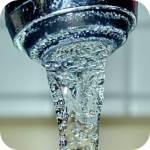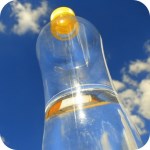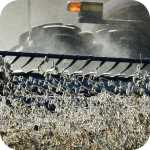 The environment is everything around you and unfortunately it is full of things that make getting pregnant more difficult. There are numerous chemicals and toxins to be found in the food you eat, the liquids you drink and the places you work. Reducing your exposure to these chemicals and toxins for three months or more could help you conceive, especially if you are borderline fertile.
The environment is everything around you and unfortunately it is full of things that make getting pregnant more difficult. There are numerous chemicals and toxins to be found in the food you eat, the liquids you drink and the places you work. Reducing your exposure to these chemicals and toxins for three months or more could help you conceive, especially if you are borderline fertile.
Before I continue however, do take a pragmatic approach when trying to limit your exposure to environmental hazards. You can’t avoid everything out there and getting stressed about it may be worse for your fertility than the small quantities of toxins you are getting exposed to. Do what you can and don’t worry about the rest.
Xenoestrogens and Fertility
Of all the environmental factors affecting fertility, xenoestrogens are thought to be one of the biggest problems for fertility at the moment. Xenoestrogens are any chemicals that mimic the female hormone oestrogen. When ingested, they can disrupt the body’s natural hormonal balance, confusing it and making it more difficult for you to get pregnant. If you are wondering just how effective they are at disrupting fertility, the majority of contraceptive pills contain them. So if you can avoid them, or at least can cut down on them, the chances are your fertility will improve. The following are some of the most common sources of xenoestrogens:
Dietary Xenoestrogens
 Modern farming techniques can use pesticides which contain xenoestrogens. However, pesticides are also toxic in other ways, so I am covering them in their own section later on. Instead, I’m going to use this section to talk about one of the worse dietary offenders for natural xenoestrogens: soy beans.
Modern farming techniques can use pesticides which contain xenoestrogens. However, pesticides are also toxic in other ways, so I am covering them in their own section later on. Instead, I’m going to use this section to talk about one of the worse dietary offenders for natural xenoestrogens: soy beans.
Soy is often thought of as a healthy food. However, what is not widely publicised is that soy contains high levels of xenoestrogens. Cutting down on your soy intake won’t do you any harm and may be the boost your fertility is looking for. Also, soy consumption has been linked to male infertility, so make sure your partner cuts down on his consumption while trying for a baby. You can find soy in tofu, soy milk, soy sauce, soy burgers, protein supplements, miso, tempeh and edamame, among many other things.
Tap Water Xenoestrogens
 For years the contraceptive pill has helped prevent unwanted pregnancies, but now it may be preventing people from getting pregnant who aren’t even taking it. This is because tap water in large towns and cities contain high levels of the synthetic oestrogen used in the pill. But how did it get there?
For years the contraceptive pill has helped prevent unwanted pregnancies, but now it may be preventing people from getting pregnant who aren’t even taking it. This is because tap water in large towns and cities contain high levels of the synthetic oestrogen used in the pill. But how did it get there?
The synthetic oestrogen (a xenoestrogen) used in the pill is not easily destroyed and for decades women on the pill have been excreting it in their urine into the waste water system. From here it goes into water recycling plants where it survives the water treatment and comes out in the newly created tap water.
This is more of a problem for people who live in large towns and cities, where the drinking water has been recycled several times. In London for example, it has been said the tap water has been through seven other people before you drink it. Yuck!
To reduce your intake of the synthetic oestrogen in tap water, you can buy water filters that claim they remove most of the xenoestrogen. Alternatively, you could buy bottled water. Though as you’ll see from the sections below, try to purchase that in glass bottles rather than in plastic ones or don’t leave it in a plastic bottle for long periods.
Soft Plastics Xenoestrogens
Many soft plastics, such as food packaging, plastic bottles and cellophane contain xenoestrogens. Over time these chemicals can leach from the plastics into the food or drink they hold. In recent years, many companies have taken steps to remove or reduce xenoestrogens from their plastics. However, we live in a global food market and many companies around the world still continue to use xenoestrogens in their food and drinks packaging.
Avoiding all food and drink that is in plastic packaging would be very difficult. But you can cut down on their use while you are trying for a baby. Also the transfer of xenoestrogens from plastic to food and drink speeds up when the plastic is subjected to heat. So think again before you heat a ready meal up in the oven or leave bottled water in your car on a sunny day.
Bisphenol-A (BPA) and Fertility

BPA is a chemical used in the production of some plastics and resins. Animals studies have shown that BPA can affect the reproductive hormones and cause problems with fertility. It has also been shown to have other potential harmful effects on your health. BPA is commonly found in plastic bottles, food storage containers and the lining of some cans. Similar to xenoestrogens, the chemical can leach out from the plastics into the food and drink they contain. This process is accelerated if the container is exposed to heat, like hot drinks in styrofoam cups or meals microwaved in plastic.
Though BPA’s negative impact on health has not been completely proven, many manufacturers are now producing packaging that does not contain BPA. Because of this, many products have the label BPA free. However, new research indicates BPA free products maybe as unsafe as those containing them.
If you use plastic containers at home to store food or liquids, consider replacing them with containers made from glass, ceramic or stainless steel. I used to keep and reuse old takeaway containers to store food. Not anymore.
Phthalates and Fertility
Another group of chemicals which can affect your fertility are the phthalates (pronounced tha-lates). These are used to soften plastics and can be found in vinyl, plastic wrap and in some toiletries such as body creams and perfumes. These chemicals also simulate the body’s hormones, causing reproductive disorders. The good news is that as of 2016 these chemicals have been banned in the European Union and some states in America. However, they can still be found elsewhere around the world and in some imports into the EU.
Unfortunately, they are difficult to avoid as there is no easy way of telling if a plastic has been treated with phthalates or not. Though hopefully with time, more countries will come to ban them and you can check on the progress of banning phthalates on Wikipedia here: Phthalates Legal Status.
Pesticides and Fertility

Pesticides are sprayed on food crops to kill anything that might eat the crop. By that very nature, they are some of the most toxic chemicals around and it is maybe no surprise they have been linked to infertility problems in both women and men.
Pesticides are a not a single chemical, but many different types (including xenoestrogens). They are classified by the pest they are intended to kill. For example: insecticides kill insects, rodenticides kill mice and rats, herbicides kill plants, and there are many more types besides. Studies show these chemical cocktails not only affect your chances of getting pregnant, but can cause menstrual disorders, including endometriosis, increased risk of miscarriage and birth defects.
The more toxic pesticides are regulated in most developed countries, but food is now a global market and many countries still use pesticides harmful to humans in their crop production. Because of this, you are very unlikely to cut out all pesticides from your diet, but you can reduce the amount you consume.
What Can You Do to Avoid Pesticides?
The easiest way to reduce the amount of pesticides consumed is to buy organic fruit and vegetables while trying to get pregnant. This can be expensive however and quite often the food you are looking for isn’t in the organic section. Since most of the pesticides will be on the outside of the fruit and veg, washing it thoroughly before eating should remove some of the toxins.
Non-Organic Meat and Fertility

Some modern farming techniques use hormones to stimulate growth of their livestock. These hormones can be passed on to you if you eat meat that has been produced this way. Once consumed, they can disrupt your body’s normal hormonal balance, reducing your fertility. It’s not just the hormones you have to worry about, often livestock is fed with food grown with pesticides.
You can avoid consuming meat with hormones and pesticides by buying organic. However, this can be very expensive, so if you are on a budget, just buy organic chicken, which is one of the worse meats for hormones and chemicals. Alternatively, not all modern farming is bad, so visit your local butcher and ask him how the animals have been treated before buying their meat.
Mercury and Fertility

Mercury is another environmental toxin which has been linked to infertility. It can cause blocked fallopian tubes, endometriosis and hormonal disorders in women. It has also been linked to nervous system damage in unborn babies.
Mercury is found naturally in the environment. However, the biggest risk is from mercury that is the product of industrial pollution. This gets dumped in rivers and washed into the ocean and seas. From there it works its way into the food chain.
All fish have some mercury in them. However, predatory fish have the most as they collect the mercury from the other fish they eat. Also larger, long living fish have more as their long lives give them more time to accumulate mercury from the sea.
What Can You Do to Avoid Mercury?
You don’t need to give up eating all fish, especially as they are rich in Omega 3 fatty acids that are beneficial for conception. However, it is best to avoid eating sushi, swordfish, shark, tuna, yellowtail, tilefish, sea bass and mackerel while you are trying to conceive and while you are pregnant.
Occupation, Hobbies and House Work

Your chances of getting pregnant could be reduced if you are regularly exposed to chemicals or toxins as part of your job, hobby or house work. Chemicals which are known to have an effect include:
• Lead – exposure to high levels can cause early miscarriage
• Dibromochloropropane (DBP) – this is commonly found in pesticides and if regularly handled can cause ovarian problems
• Ethylene Oxide – this chemical is also found in pesticides as well as being used for sterilising some medical equipment. Excessive exposure can result in early miscarriage
• Medical Treatments or Equipment – regular exposure to radiation (e.g. from X-Rays), or some medical drugs (e.g. chemotherapy) could cause a wide range of fertility problems
Obviously you can’t just give up your job, hobbies make you happy and house work is essential. However, there are preventative measures that you can take to help minimise your exposure to harmful substances:
- Always follow the safety regulations of your profession or the safety instructions of your hobby
- Wear protective clothing such as gloves, overalls and dust-masks
- Do not use pesticides or fertilisers when gardening
- Try and limit your exposure to household chemicals
- Wash your hands thoroughly before eating
- Make sure your work area is well ventilated if you are a painter or work with chemicals
- Shower and change your clothing immediately after you finish work or your hobby
If you work with chemicals in either your job or your hobby and have concerns about your exposure to them, discuss them with your manager, doctor, or ask to see an occupational health doctor.
Environmental Factors Final Thoughts
Trying to get pregnant is stressful enough without worrying about everything you do, eat or drink. The overall impact from environmental factors on your fertility is likely to be small. So don’t beat yourself up if you drink a glass of tap water or can’t afford to buy expensive organic vegetables and meat. You are never going to be able to rule out every possible environmental factor that could affect your fertility. So only do what you can and try not to worry about what you can’t.
And don’t forget that environmental factors aren’t just the responsibility of the woman. Men’s fertility can also be affected by their lifestyle and what they eat, maybe even more so than a woman’s. For more information of the environmental factors affecting fertility in men and what you can do to help them boost their fertility, check out the section: A Man’s Guide To Supercharging His Sperm.
Links to Popular Related Pages






